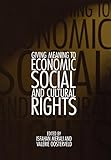Giving Meaning to Economic, Social, and Cultural Rights / ed. by Valerie Oosterveld, Isfahan Merali.
Material type: TextSeries: Pennsylvania Studies in Human RightsPublisher: Philadelphia : University of Pennsylvania Press, [2011]Copyright date: ©2001Description: 1 online resource (280 p.) : 3 illusContent type:
TextSeries: Pennsylvania Studies in Human RightsPublisher: Philadelphia : University of Pennsylvania Press, [2011]Copyright date: ©2001Description: 1 online resource (280 p.) : 3 illusContent type: - 9780812236019
- 9780812205695
- 323
- JC571 ǂb G525 2001eb
- online - DeGruyter
- Issued also in print.
| Item type | Current library | Call number | URL | Status | Notes | Barcode | |
|---|---|---|---|---|---|---|---|
 eBook
eBook
|
Biblioteca "Angelicum" Pont. Univ. S.Tommaso d'Aquino Nuvola online | online - DeGruyter (Browse shelf(Opens below)) | Online access | Not for loan (Accesso limitato) | Accesso per gli utenti autorizzati / Access for authorized users | (dgr)9780812205695 |
Frontmatter -- Contents -- Introduction -- Part I. Conceptualizing Economic, Social, and Cultural Rights: Dissolving Categories -- 1. Toward the Institutional Integration of the Core Human Rights Treaties -- 2. From Division to Integration: Economic, Social, and Cultural Rights as Basic Human Rights -- 3. Defending Women's Economic and Social Rights: Some Thoughts on Indivisibility and a New Standard of Equality -- Part II. Current Themes: Applying Cross-Cutting Analysis -- 4. Human Rights Mean Business: Broadening the Canadian Approach to Business and Human Rights -- 5. Feminism After the State: The Rise of the Market and the Future of Women's Rights -- 6. Advancing Safe Motherhood Through Human Rights -- 7. Canada's New Child Support Guidelines: Do They Fulfill Canada's International Law Obligations to Children? -- Part III. Giving Meaning: Protection and Justiciability of Economic, Social, and Cultural Rights -- 8. Implementing Economic, Social, and Cultural Rights: The Role of National Human Rights Institutions -- 9. Bringing Economic, Social, and Cultural Rights Home: Palestinians in Occupied East Jerusalem and Israel -- 10. The Maya Petition to the Inter-American Commission on Human Rights: Indigenous Land and Resource Rights and the Conflict over Logging and Oil in Southern Belize -- Notes -- List of Contributors -- Index -- Acknowledgments
restricted access online access with authorization star
http://purl.org/coar/access_right/c_16ec
The Universal Declaration of Human Rights, arguably the founding document of the human rights movement, fully embraces economic, social, and cultural rights, as well as civil and political rights, within its text. However, for most of the fifty years since the Declaration was adopted by the General Assembly of the United Nations, the focus of the international community has been on civil and political rights. This focus has slowly shifted over the past two decades. Recent international human rights treaties-such as the Convention on the Rights of the Child and the Convention on the Elimination of All Forms of Discrimination Against Women-grant equal importance to protecting and advancing nonpolitical rights.In this collection of essays, Isfahan Merali, Valerie Oosterveld, and a team of human rights scholars and activists call for the reintegration of economic, social, and cultural rights into the human rights agenda. The essays are divided into three sections. First the contributors examine traditional conceptualizations of human rights that made their categorization possible and suggest a more holistic rights framework that would dissolve such boundaries. In the second section they discuss how an integrated approach actually produces a more meaningful analysis of individual economic, social, and cultural rights. Finally, the contributors consider how these rights can be monitored and enforced, identifying ways international human rights agencies, NGOs, and states can promote them in the twenty-first century.
Issued also in print.
Mode of access: Internet via World Wide Web.
In English.
Description based on online resource; title from PDF title page (publisher's Web site, viewed 24. Apr 2022)


